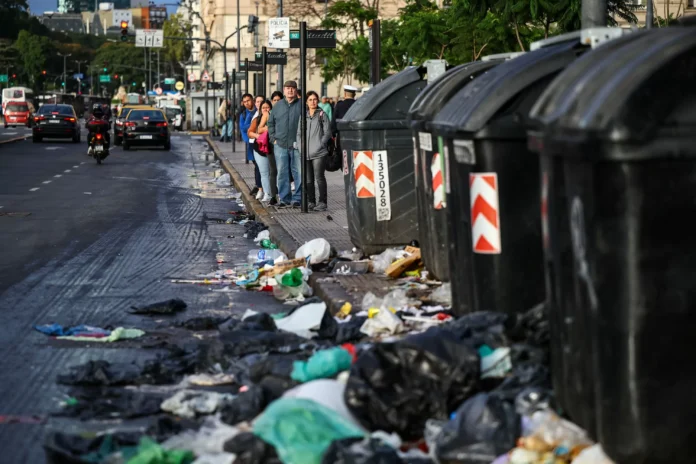Unions in Argentina Staged a General Strike Against President Javier Milei’s Libertarian Government, Causing Widespread Disruptions
On Thursday, unions in Argentina staged a general strike in protest against President Javier Milei’s libertarian government. The strike caused widespread disruptions, including halted trains and suspended flights, as workers across various industries joined forces to demand better working conditions and protection of their rights.
The strike, which was organized by the General Confederation of Labor (CGT), saw participation from workers in transportation, education, healthcare, and other essential services. The streets of Buenos Aires were filled with protesters carrying banners and chanting slogans, demanding that the government take immediate action to address their concerns.
One of the main issues raised by the unions is the government’s proposed labor reform, which they believe will weaken workers’ rights and make it easier for employers to dismiss employees. The reform, which is part of President Milei’s efforts to attract foreign investment and boost the economy, has been met with strong opposition from unions who fear it will lead to job insecurity and exploitation of workers.
In addition to the labor reform, unions are also demanding an increase in wages to keep up with the rising cost of living in Argentina. The country has been facing high inflation rates, making it difficult for workers to make ends meet. The unions argue that the government’s policies have only worsened the economic situation for the working class, and they are now paying the price.
The strike had a significant impact on the country, with many businesses and services coming to a standstill. Train services were suspended, causing inconvenience to commuters, while flights were also affected, leading to delays and cancellations. Schools and hospitals were also affected, with teachers and healthcare workers joining the strike to demand better working conditions and higher salaries.
Despite the disruptions, the unions remained resolute in their demands, vowing to continue their fight until the government addresses their concerns. They have called for a dialogue with the government to find a solution that benefits both workers and the economy.
The strike also received support from various political parties and social organizations, who joined the protesters in solidarity. They believe that the government’s policies are not in the best interest of the people and that the working class is bearing the brunt of the economic crisis.
President Milei, on the other hand, has condemned the strike, calling it a “political maneuver” by the opposition to destabilize his government. He has accused the unions of using their power to disrupt the country and has refused to negotiate with them.
The strike has once again highlighted the deep divide between the government and the working class in Argentina. While President Milei’s policies may be aimed at boosting the economy, they have come at the cost of the workers’ rights and well-being. The unions have made it clear that they will not back down until their demands are met, and it is now up to the government to listen and take action.
In conclusion, the general strike in Argentina has brought to light the struggles of the working class and their determination to fight for their rights. The unions have shown that they are a force to be reckoned with and will not be silenced. It is now up to the government to listen to their demands and work towards finding a solution that benefits all parties involved. Let us hope that this strike serves as a wake-up call for the government to prioritize the well-being of its people and work towards a more equitable society.


